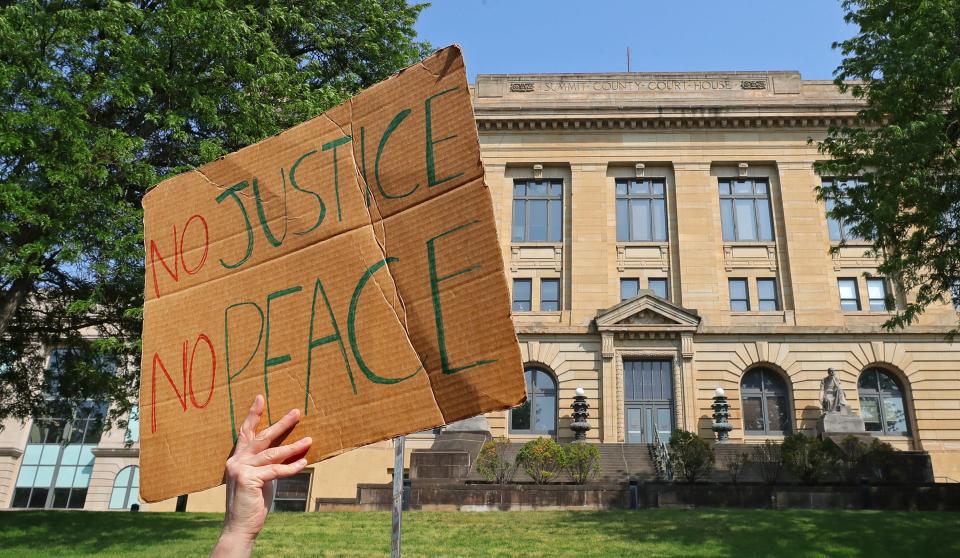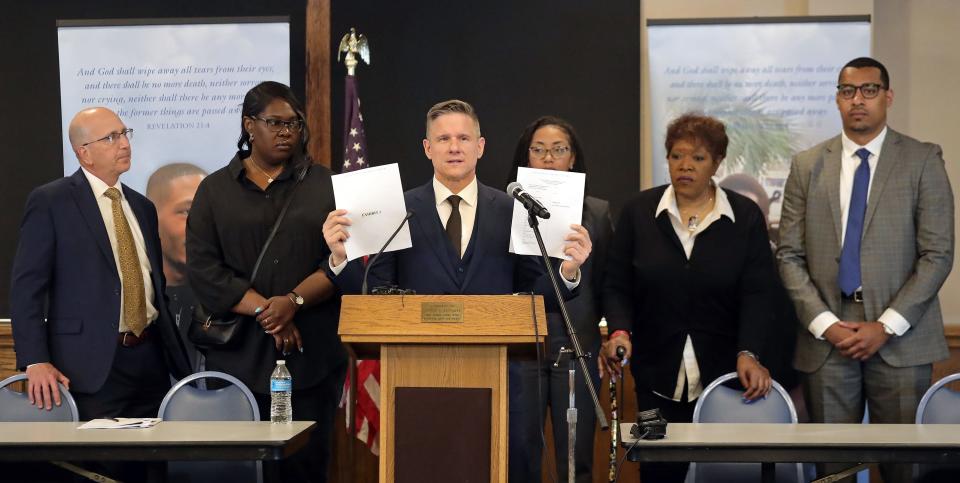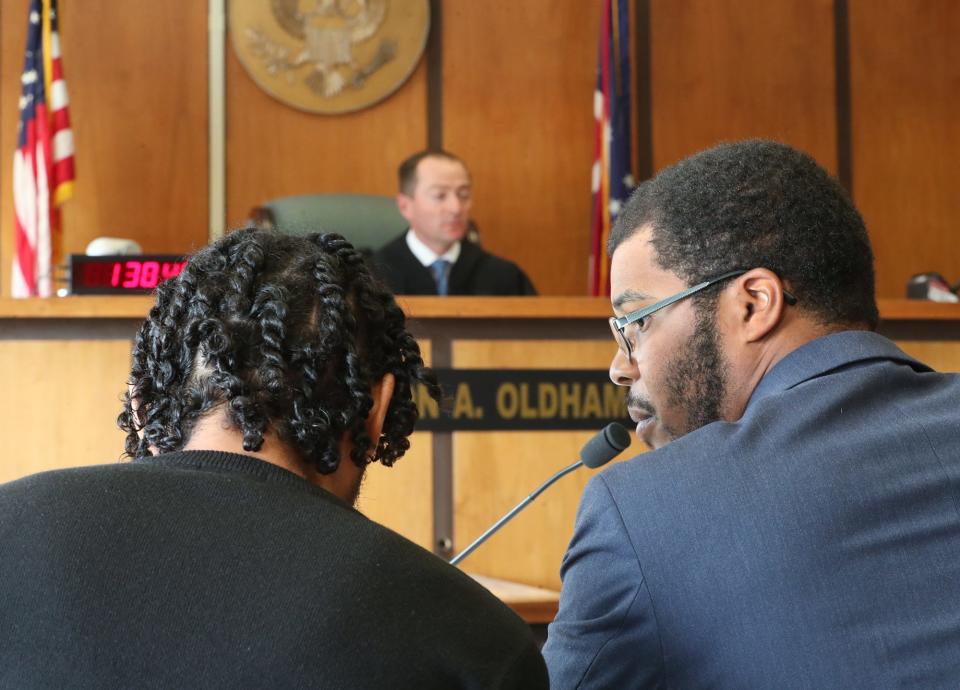What's happening with 3 lawsuits against Akron for Jayland Walker's shooting and protests?
Akron is facing three lawsuits pertaining to Jayland Walker’s shooting by police and the protests that followed it.
The lawsuits allege excessive force in Walker’s shooting, unlawful arrests involving those protesting Walker’s shooting, and unnecessary force – including the use of tear gas and pepper spray – against protesters.
Walker, 25, was shot more than 40 times on June 27, 2022, by Akron police officers after fleeing first in his vehicle and then on foot. He was unarmed, though investigators determined he fired a shot out of his car window while fleeing. A gun was found in his car.

Numerous protests followed Walker’s shooting and a decision in April by a special grand jury not to indict the eight officers who shot Walker.
The trio of suits were filed in the past five months in U.S. District Court.
Here are highlights of these suits, what they seek and where they stand.
Justified or 'unacceptable?': What hours of body-cam footage from Copley Road protest shows
Jayland Walker’s family sues, claiming officers used excessive force

Who filed the suit: The family of Jayland Walker.
Who is being sued: The city of Akron, the eight officers who shot Walker, and several other officers and public officials.
What the suit alleges: Excessive force in Walker’s shooting, which the family claims is part of a long history of racism and violence within the Akron Police Department. The claims include excessive force, supervisory responsibility, municipal responsibility and constitutional violations.
What the suit seeks: Compensatory and punitive damages of at least $45 million, which the family says is roughly $1 million for each bullet that struck Walker, as well as attorneys’ fees and costs. Also, that “Akron be made to adopt an appropriate policy to prevent future instances of the type of misconduct” described in the lawsuit.
What Akron has said: Akron officials declined to comment after the lawsuit was filed in mid-June, noting that the city doesn’t discuss pending litigation. The city hasn’t yet filed a response in the case, according to court records.
Which judge is assigned: U.S. District Court Judge John Adams in Akron.
24 people charged in early Walker protests sue over their arrests and prosecutions

Who is suing: Twenty-four people who were arrested last July during protests of Walker’s shooting in downtown Akron. Among the plaintiffs are four high-profile community activists, including Jacob Blake Sr., whose son was paralyzed in a police shooting in Wisconsin, and Bianca Austin, the aunt of Breonna Taylor, who was shot and killed in a botched police raid in Louisville, Kentucky.
Who is being sued: The city of Akron, Mayor Dan Horrigan, Police Chief Steve Mylett, 17 police supervisors and numerous Akron officers and detectives, as well as University of Akron officers and a Summit County Sheriff’s deputy who assisted with the protests.
More: Dismissals, acquittals and a few convictions: What happened with 2022 Akron protest cases?
What the suit alleges: The suit claims the city unlawfully arrested people who were expressing themselves or were just in the wrong place at the wrong time and prosecuted them in cases that lasted months. All 24 of their cases ultimately were dismissed or resulted in not-guilty verdicts by a jury or judge. The claims include excessive force, false arrest and imprisonment, malicious prosecution, assault and battery, abuse of process, and breach of duty.
What the suit seeks: Compensatory and punitive damages, attorney fees and costs, and injunctive relief against the city for its “unlawful policies and training for the Akron Police Department.”
What Akron has said: Akron declined to comment when the suit was filed in late June. The city hasn’t yet filed a response to the complaint, according to court records.
Which judge is assigned: U.S. District Court Judge James Gwin in Cleveland.
Akron group claims police used excessive force in Copley Road protest

Who is suing: The Akron Bail Fund, a local group that assisted people arrested in the Walker protests with their bonds and whose members have participated in protests.
Who is being sued: The city of Akron.
What the suit alleges: The suit claims protesters’ constitutional and civil rights were violated when officers used chemical munitions against them during an April 19 protest on Copley Road. Other complaints include the city limiting where protesters could gather and police making unwarranted stops and arrests and towing protesters’ vehicles.
What has happened so far: The city agreed to a temporary restraining order that forbids the use of tear gas, pepper spray and other measures against non-violent protesters. This order will last until the lawsuit is settled.
What the suit seeks: Damages for “physical and mental pain and suffering,” as well as punitive damages and attorneys’ fees. Requests a permanent order forbidding the city from further violating protesters’ constitutional rights.
What Akron has said: The city denied most of the allegations in its response to the complaint and said law enforcement acted “reasonably, in good faith and not in violation of any clearly established federal, state or local right.” If there were any injuries or damages, these were “caused by plaintiff’s own actions or inactions,” the city said.
Akron police respond: APD video shows Jayland Walker protesters throwing items before officers used chemicals
Which judge is assigned: U.S. District Judge Charles Esque Fleming in Cleveland.
What happens next: A status conference is set for Dec. 15 and expert reports are due by Jan. 31. A jury trial hasn’t been scheduled.
Stephanie Warsmith can be reached at swarsmith@thebeaconjournal.com, 330-996-3705 and on Twitter: @swarsmithabj.
This article originally appeared on Akron Beacon Journal: Akron faces 3 suits tied to Jayland Walker's shooting and protests

